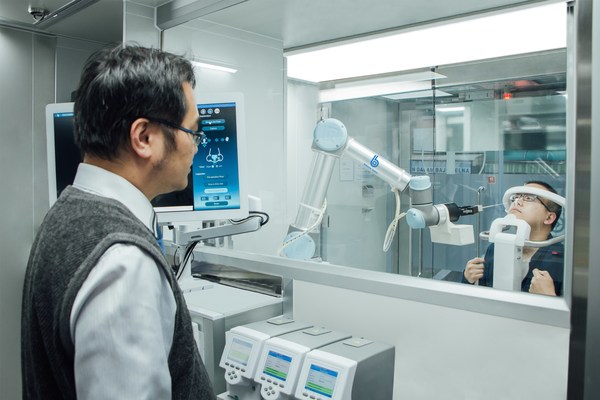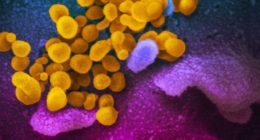HSINCHU, May 6, 2021 /PRNewswire/ — Brain Navi Biotechnology Co., Ltd., a brain surgery robotic company, is launching “zero-contact” medical stations in hospitals across Taiwan, fully protect medical staff and patients from the cross-infection of “highly contagious diseases.”
The biggest risk of infection for medical staff is during intubation, nasal swabbing, and personal protective equipment (PPE) removal, says Dr. Jerry Chen, the Brain Navi CEO. He adds that “Since the SARS crisis in Asia 17 years ago, there was no advancement in the protection technology for medical staff. How could medical staff protect us if they are not well protected in the first place?”.
As a physician himself with a full understanding of the frontline medical staff’s anxiety, this motivates Dr. Chen to reimagine testing for infectious diseases using robotics, enabling zero-contact between medical staff and patients.
Zero-Contact Medical Station, the robotic technology for COVID-19 testing, innovated by Brain Navi Biotechnology from Taiwan.
The Zero-Contact Medical Station with robotics technology is creating a new normal of Covid-19 testing in Taiwan. Medical staff and patients stay in an isolated chamber with safety features, including HEPA filter, UVC lamps, a ventilation system, and a negative 8 Pa air pressure.
Under medical staff’s control and supervision, a Nasal Swab Robot performs the nasopharynx specimen collection. This allows the medical staff to achieve nasal swabbing without patient contact and eliminates the need to wear a PPE. Nasal Swab Robot just obtained the CE mark with Class I.
The Zero-Contact Medical Station achieves zero-contact swabbing and pipetting tasks for lab technicians. After swabbing, an automated robot will then pipette the collected specimen and prepare an essay for PCR diagnosis. The robotic systems are integrated with Roche’s RT-PCR device allowing automatic and efficient process. The entire testing process from robot’s collection to result generation can be done in 25 minutes.
Through robotics automation and consolidation of PCR lab and diagnosis in one medical station, the Zero-Contact Medical Station protects medical staff and minimizes precious staffing, improves lab testing capacity, and reduces transport and reporting time.
The zero-contact features and rapid PCR testing with minimal staffing make this station an ideal solution for large-scale testing at public venues such as cruise ships, stadiums, and airports, allowing your country to reopen the economy or commence the travel bubble with safety measures.










